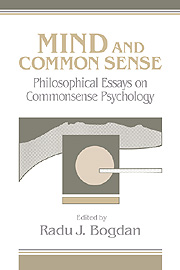Book contents
- Frontmatter
- Contents
- List of Contributors
- 1 The Folklore of the Mind
- 2 Analysis without Noise
- 3 Folk Psychology and the Explanation of Human Behavior
- 4 Methodological Reflections on Belief
- 5 Consciousness and Content
- 6 The Inevitability of Folk Psychology
- 7 How is Eliminative Materialism Possible?
- 8 The Long Past and the Short History
- 9 Common Sense Naturalized: The Practical Stance
- Index
5 - Consciousness and Content
Published online by Cambridge University Press: 24 September 2009
- Frontmatter
- Contents
- List of Contributors
- 1 The Folklore of the Mind
- 2 Analysis without Noise
- 3 Folk Psychology and the Explanation of Human Behavior
- 4 Methodological Reflections on Belief
- 5 Consciousness and Content
- 6 The Inevitability of Folk Psychology
- 7 How is Eliminative Materialism Possible?
- 8 The Long Past and the Short History
- 9 Common Sense Naturalized: The Practical Stance
- Index
Summary
Naturalism in the philosophy of mind is the thesis that every property of mind can be explained in broadly physical terms. Nothing mental is physically mysterious. There are two main problems confronting a naturalistically inclined philosopher of mind. There is, first, the problem of explaining consciousness in broadly physical terms: In virtue of what does a physical organism come to have conscious states? And, second, there is the problem of explaining representational content – intentionality – in broadly physical terms: In virtue of what does a physical organism come to be intentionally directed towards the world? We want to know how consciousness depends upon the physical world; and we want to know, in natural physical terms, how it is that thoughts and experiences get to be about states of affairs. We want a naturalistic account of subjectivity and mental representation. Only then will the naturalist happily accept that there are such things as consciousness and content.
Recent years have witnessed a curious asymmetry of attitude with respect to these two problems. Although there has been much optimism about the prospects of success in accounting for intentionality, pessimism about explaining consciousness has deepened progressively. We can, it is felt, explain what makes a mental state have the content it has; at least there is no huge barrier of principle in the way of our doing so.
- Type
- Chapter
- Information
- Mind and Common SensePhilosophical Essays on Common Sense Psychology, pp. 71 - 92Publisher: Cambridge University PressPrint publication year: 1991
- 3
- Cited by



